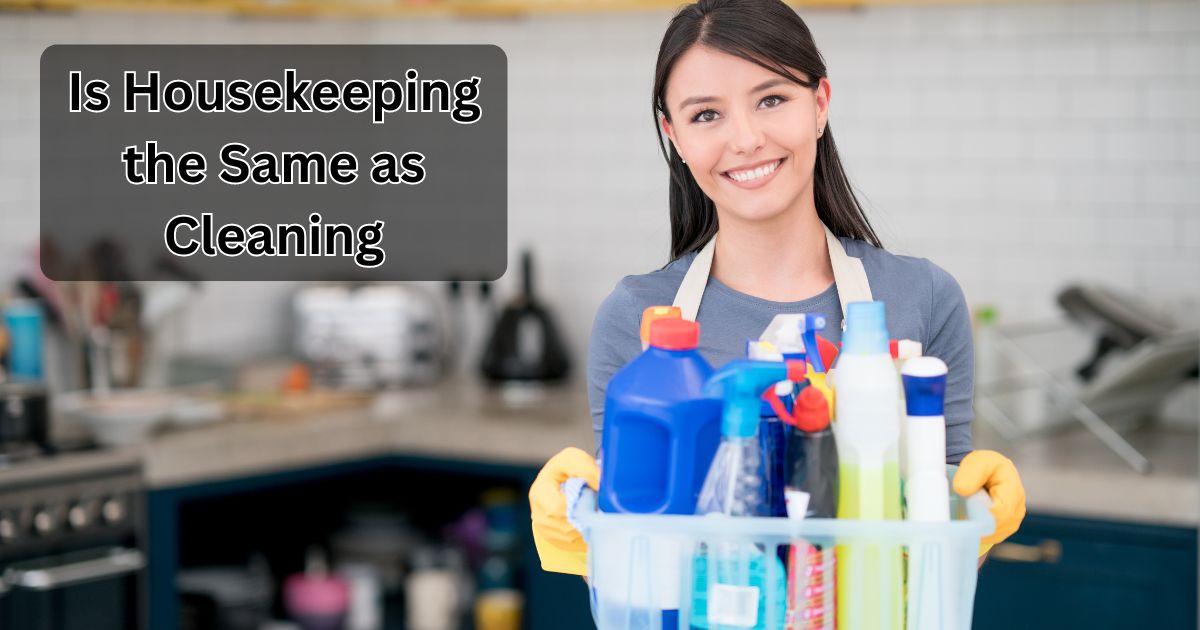Housekeeping is a broad term encompassing a range of tasks that maintain the overall orderliness and functionality of a living or working space. To answer the question Is Housekeeping the Same as Cleaning?—the answer is no. Housekeeping involves more than just cleaning; it includes organizing, maintaining inventory, and ensuring that spaces are not only clean but also comfortable and operational. Housekeeping responsibilities can range from making beds and dusting surfaces to managing supplies and arranging furniture. This multifaceted role is essential in both residential and professional settings, contributing to a well-maintained and efficient environment.
What Is Cleaning?
Cleaning, on the other hand, refers specifically to the removal of dirt, dust, and contaminants from surfaces and spaces. It involves tasks such as vacuuming, mopping, scrubbing, and sanitizing. The primary goal of cleaning is to ensure hygiene and eliminate harmful pathogens that could affect health. While cleaning is a critical component of housekeeping, it is more focused on the physical removal of dirt and the upkeep of cleanliness. Understanding the distinction between cleaning and housekeeping helps clarify the scope and expectations of each role.
Purpose of the Article
This article aims to explore whether housekeeping and cleaning are the same or distinct roles. By breaking down the responsibilities, tools, and skills involved in each, we provide a comprehensive understanding of these essential functions. Whether you are a homeowner, a business owner, or a professional in the field, understanding these differences will help you make informed decisions about managing and maintaining your environment.
Importance of Understanding the Difference
Recognizing the differences between housekeeping and cleaning is crucial for efficient management and maintenance. While both roles overlap, they each have unique responsibilities and require different skill sets. Understanding these distinctions ensures that all tasks are properly addressed and that spaces are not only clean but also well-organized and functional. This knowledge also helps in making informed decisions about hiring professionals or managing tasks independently.
Defining Housekeeping
Overview of Housekeeping
Housekeeping encompasses a wide range of activities aimed at maintaining the overall order and functionality of a space. It includes tasks such as organizing, managing supplies, and ensuring that the environment is welcoming and comfortable. Housekeeping is not limited to cleaning; it also involves planning and executing various tasks to keep a space in optimal condition. This comprehensive approach is crucial in settings like hotels, offices, and homes, where maintaining a high standard of order and functionality is essential.
Common Tasks Involved in Housekeeping
Common housekeeping tasks include making beds, dusting furniture, organizing closets, and managing household or office supplies. In residential settings, housekeeping might also involve meal preparation, laundry, and managing personal items. In professional settings, it can include managing conference room setups, organizing office supplies, and maintaining common areas. The goal of these tasks is to ensure that the environment is orderly, functional, and pleasant for its occupants.
Housekeeping in Different Settings (Homes, Hotels, Offices)
Housekeeping responsibilities can vary significantly depending on the setting. In homes, housekeeping involves daily tasks such as cleaning kitchens, bathrooms, and living areas, as well as managing personal belongings. In hotels, housekeeping is more formalized, with staff responsible for cleaning guest rooms, public areas, and managing linen services. Offices require a different approach, focusing on maintaining workspaces, meeting rooms, and communal areas to ensure a productive and comfortable work environment.
Defining Cleaning
Overview of Cleaning
Cleaning is the process of removing dirt, dust, and contaminants from surfaces and spaces. This task is essential for maintaining hygiene and preventing the spread of illness. Cleaning involves various methods and products designed to tackle different types of dirt and surfaces, from wiping down countertops to deep cleaning carpets. The primary focus of cleaning is on sanitation and removing visible and invisible contaminants to create a healthier environment.
Common Cleaning Tasks
Common cleaning tasks include vacuuming carpets, mopping floors, dusting surfaces, and washing windows. Other tasks involve scrubbing sinks and toilets, cleaning kitchen appliances, and removing trash. These activities are aimed at maintaining a high standard of cleanliness and hygiene. Cleaning tasks are typically performed on a scheduled basis, depending on the level of use and the specific requirements of the space.
Cleaning in Various Environments (Residential, Commercial, Industrial)
Cleaning practices can differ significantly depending on the environment. In residential settings, cleaning often involves routine tasks like vacuuming and dusting. Commercial cleaning may include more specialized tasks, such as sanitizing high-touch areas and managing waste disposal. Industrial cleaning often requires heavy-duty equipment and specialized cleaning agents to handle large-scale operations and industrial equipment. Each environment has unique needs and challenges that influence the cleaning methods and frequency.
Housekeeping vs. Cleaning: Key Differences
Scope of Work
The scope of housekeeping is broader than that of cleaning. Housekeeping involves a variety of tasks aimed at maintaining overall order and functionality, including cleaning. It encompasses organizing, managing supplies, and ensuring a comfortable environment. Cleaning, however, focuses specifically on removing dirt and contaminants. While cleaning is a component of housekeeping, it is just one aspect of the broader scope of housekeeping responsibilities.
Frequency of Tasks
Housekeeping tasks can be performed on a daily, weekly, or monthly basis, depending on the specific needs of the space. For instance, tasks like making beds and organizing spaces might be done daily, while deep cleaning tasks might be scheduled weekly or monthly. This distinction highlights the difference when asking, “Is Housekeeping the Same as Cleaning?” Cleaning tasks are often performed more frequently, especially in high-traffic areas. Regular cleaning is essential for maintaining hygiene and preventing the buildup of dirt and contaminants. Understanding this difference helps in appreciating how housekeeping integrates broader responsibilities beyond just routine cleaning.
Tools and Equipment Used
The tools and equipment used for housekeeping and cleaning can differ significantly. Housekeeping may require items such as organizing bins, furniture polish, and laundry supplies. In contrast, cleaning often involves tools like vacuums, mops, cleaning solutions, and specialized equipment for tasks like carpet cleaning or window washing. Understanding the different tools and their purposes can help in effectively managing both housekeeping and cleaning tasks.
Skill Set Required
Housekeeping requires a diverse skill set, including organizational abilities, attention to detail, and multitasking. Housekeepers must be adept at managing various tasks simultaneously and maintaining an organized environment. Cleaning, while also requiring attention to detail, focuses more on specific techniques and knowledge of cleaning products. Skills such as understanding which products to use on different surfaces and effective cleaning methods are crucial in ensuring thorough and effective cleaning.
Overlap Between Housekeeping and Cleaning
Tasks That Fall Under Both Categories
Some tasks fall under both housekeeping and cleaning categories. For example, dusting furniture involves both organizing and cleaning surfaces. Similarly, maintaining a clean and organized kitchen requires both housekeeping skills (such as organizing pantry items) and cleaning skills (such as wiping down countertops). This overlap highlights the interconnected nature of these tasks and underscores the importance of understanding both roles in maintaining a well-kept environment.
When Housekeeping Includes Cleaning
In many cases, housekeeping includes cleaning as part of its broader responsibilities. For instance, a housekeeper may perform tasks such as vacuuming carpets, washing dishes, and cleaning bathrooms as part of their role. This integration ensures that both cleanliness and organization are addressed, contributing to a well-maintained and functional space. Understanding this integration helps in recognizing the comprehensive nature of housekeeping and its impact on overall space management.
Examples from Different Industries
Different industries illustrate how housekeeping and cleaning roles can overlap. In hotels, housekeeping staff are responsible for both cleaning guest rooms and organizing amenities. In offices, facilities management may involve both maintaining cleanliness and organizing supplies. These examples demonstrate how the combined efforts of housekeeping and cleaning contribute to creating optimal environments in various settings, emphasizing the need for a holistic approach to maintenance.
Housekeeping Responsibilities: A Closer Look
Daily Housekeeping Duties
Daily housekeeping duties involve routine tasks aimed at maintaining order and functionality. These tasks typically include making beds, tidying up common areas, and ensuring that everything is in its proper place. In residential settings, daily housekeeping might also involve managing laundry and meal preparation. For businesses and hotels, daily responsibilities may include restocking supplies and ensuring that all areas are clean and organized for the day ahead.
Weekly and Monthly Housekeeping Tasks
Weekly and monthly housekeeping tasks involve more detailed and intensive efforts. These tasks might include deep cleaning areas like bathrooms and kitchens, organizing closets, and managing seasonal items. In commercial and hospitality settings, this could involve tasks such as cleaning behind appliances or performing maintenance checks. These periodic tasks are essential for maintaining a high standard of cleanliness and organization over time.
Seasonal Housekeeping
Seasonal housekeeping involves tasks specific to different times of the year. This might include tasks like spring cleaning, where deep cleaning and decluttering are prioritized, or preparing a home for winter by checking heating systems and insulating windows. Seasonal housekeeping ensures that the environment is not only clean but also prepared for changes in weather and usage patterns. This proactive approach helps in maintaining comfort and functionality throughout the year.
Cleaning Responsibilities: A Closer Look
Daily Cleaning Duties
Daily cleaning duties are crucial for maintaining hygiene and preventing the accumulation of dirt and contaminants. These tasks typically include vacuuming high-traffic areas, mopping floors, and wiping down surfaces. In residential settings, daily cleaning might also involve washing dishes and sanitizing frequently touched surfaces. For businesses and public spaces, maintaining cleanliness on a daily basis helps in ensuring a healthy and pleasant environment for occupants and visitors.
Deep Cleaning Tasks
Deep cleaning tasks go beyond routine cleaning and involve thorough and intensive cleaning of specific areas or items. This includes tasks such as cleaning carpets, washing windows, and scrubbing grout. Deep cleaning is often scheduled less frequently but is essential for maintaining a high standard of hygiene and extending the lifespan of surfaces and equipment. These tasks help in addressing areas that routine cleaning might not fully reach.
Specialized Cleaning Services
Specialized cleaning services cater to specific needs and environments. This might include services such as biohazard cleaning, post-construction cleaning, or industrial cleaning. Specialized cleaning requires specific knowledge, equipment, and techniques to handle unique challenges and ensure thorough results. These services are crucial for maintaining safety and cleanliness in environments with specialized needs.
Is Housekeeping the Same as Cleaning? Exploring Common Misconceptions
Misconception #1: Housekeeping Is Just Another Word for Cleaning
One common misconception is that housekeeping is simply another term for cleaning. While cleaning is an integral part of housekeeping, the latter encompasses a broader range of responsibilities. Housekeeping involves organizing, managing supplies, and ensuring overall functionality, in addition to cleaning. Recognizing this distinction helps in understanding the comprehensive nature of housekeeping and its role in maintaining a well-organized environment.
Misconception #2: Housekeeping Is Only About Surface Cleaning
Another misconception is that housekeeping is limited to surface cleaning. In reality, housekeeping involves both surface cleaning and a range of other tasks aimed at maintaining order and functionality. This includes organizing spaces, managing supplies, and performing routine and periodic tasks to ensure a comfortable and efficient environment. Understanding this broader scope helps in appreciating the full range of responsibilities involved in housekeeping.
Misconception #3: Professional Cleaning Services Are the Same as Housekeeping
Some people assume that professional cleaning services are equivalent to housekeeping services. While both roles involve cleaning, professional cleaning services often focus specifically on cleaning tasks and may not address other aspects of housekeeping, such as organization or supply management. Professional cleaning services are typically contracted for specific cleaning tasks, while housekeeping encompasses a wider range of responsibilities aimed at maintaining overall order and functionality.
Importance of Housekeeping Beyond Cleaning
Organizational Skills
Housekeeping requires strong organizational skills to manage various tasks and maintain an orderly environment. Effective organization ensures that spaces are not only clean but also functional and well-arranged. This includes managing supplies, arranging furniture, and maintaining systems for efficient operation. Organizational skills are crucial in both residential and professional settings, contributing to a well-maintained and efficient environment.
Maintaining a Healthy Environment
Beyond cleaning, housekeeping plays a vital role in maintaining a healthy environment. This involves managing air quality, organizing storage to prevent clutter, and ensuring that spaces are comfortable and functional. Housekeeping practices contribute to overall well-being by creating environments that are not only clean but also organized and conducive to health and comfort.
Aesthetic and Comfort Considerations
Housekeeping also addresses aesthetic and comfort considerations. This includes arranging decor, ensuring that spaces are visually pleasing, and creating a welcoming atmosphere. Effective housekeeping enhances the overall experience of the space, making it more comfortable and enjoyable for its occupants. Attention to aesthetic details and comfort is an important aspect of creating a pleasant environment.
Also Read: Henry Olyphant
Importance of Cleaning Beyond Housekeeping
Sanitation and Hygiene
Cleaning is crucial for maintaining sanitation and hygiene. Regular cleaning prevents the buildup of dirt and contaminants that can lead to health issues. By focusing on thorough and consistent cleaning practices, you can reduce the risk of illness and maintain a healthy environment. Effective cleaning is essential in both residential and professional settings to ensure that spaces remain hygienic and safe.
Prevention of Health Hazards
Cleaning helps in preventing health hazards by removing germs, allergens, and other contaminants from surfaces. Regular cleaning and disinfection are important for reducing the spread of diseases and maintaining a safe environment. This is particularly important in high-traffic areas and public spaces where the risk of contamination is higher. Effective cleaning practices contribute to overall health and well-being, highlighting that while housekeeping encompasses broader responsibilities, effective cleaning is crucial for maintaining hygiene and safety. Understanding “Is Housekeeping the Same as Cleaning?” is essential for recognizing how specialized cleaning practices play a significant role in promoting a healthy and safe environment.
Enhancing Longevity of Surfaces and Materials
Proper cleaning also extends the lifespan of surfaces and materials. Regular maintenance helps in preventing damage and wear, ensuring that items such as carpets, upholstery, and appliances remain in good condition. By addressing dirt and grime before it causes significant damage, cleaning contributes to the longevity and durability of various surfaces and materials.
The Role of Housekeeping in Professional Settings
Hotel Housekeeping
In hotels, housekeeping plays a critical role in maintaining guest satisfaction and ensuring a comfortable stay. This includes cleaning guest rooms, managing linen services, and maintaining public areas. Housekeeping staff are responsible for creating a welcoming environment and addressing any guest needs related to cleanliness and organization. The efficiency and effectiveness of hotel housekeeping significantly impact the overall guest experience.
Office Housekeeping
In office settings, housekeeping involves maintaining workspaces, conference rooms, and communal areas. This includes managing supplies, ensuring that work areas are clean and organized, and addressing any maintenance issues. Effective office housekeeping contributes to a productive and comfortable work environment, supporting employee well-being and operational efficiency.
Hospital Housekeeping
Hospital housekeeping is essential for maintaining a sterile and safe environment. This involves rigorous cleaning and disinfection practices to prevent the spread of infections. Housekeeping staff in hospitals must follow strict protocols and use specialized cleaning agents to ensure that patient areas, operating rooms, and other critical spaces are hygienic and safe. The role of hospital housekeeping is vital in supporting overall patient care and safety.
The Role of Cleaning Services in Professional Settings
Commercial Cleaning Services
Commercial cleaning services cater to businesses and public spaces, providing specialized cleaning for offices, retail spaces, and other commercial environments. These services often include tasks such as floor cleaning, window washing, and restroom sanitation. Commercial cleaning is essential for maintaining a professional and hygienic environment, supporting the overall operation and appearance of the business.
Industrial Cleaning Services
Industrial cleaning services address the unique needs of industrial facilities, including factories and warehouses. This type of cleaning often requires specialized equipment and techniques to handle heavy-duty tasks such as removing grease, cleaning machinery, and managing large-scale waste. Industrial cleaning is crucial for maintaining safety and efficiency in industrial operations.
Residential Cleaning Services
Residential cleaning services focus on maintaining cleanliness in homes. This includes tasks such as vacuuming, dusting, and bathroom cleaning. Residential cleaning services cater to individual needs, offering regular or one-time cleaning options to support homeowners in maintaining a clean and organized living environment. These services are designed to make household management easier and more convenient.
Skills Required for Effective Housekeeping
Time Management
Effective housekeeping requires strong time management skills to ensure that all tasks are completed efficiently. Housekeepers must prioritize tasks, manage their schedules, and balance various responsibilities to maintain an organized and functional space. Good time management helps in handling daily, weekly, and seasonal tasks effectively, contributing to overall success in housekeeping.
Attention to Detail
Attention to detail is crucial in housekeeping to ensure that all aspects of the environment are addressed. This includes noticing small issues, maintaining organization, and ensuring that tasks are performed thoroughly. Housekeepers must be vigilant and meticulous to maintain high standards of cleanliness and organization.
Multitasking
Housekeepers often need to multitask, managing various responsibilities simultaneously. This includes balancing tasks such as cleaning, organizing, and managing supplies. Effective multitasking helps in ensuring that all aspects of housekeeping are addressed efficiently, contributing to a well-maintained and functional environment.
Skills Required for Effective Cleaning
Knowledge of Cleaning Products
Knowledge of cleaning products is essential for effective cleaning. This includes understanding which products to use on different surfaces, the appropriate application methods, and safety considerations. Proper use of cleaning products helps in achieving thorough and effective cleaning while minimizing potential damage to surfaces.
Physical Stamina
Cleaning can be physically demanding, requiring stamina and endurance to perform tasks efficiently. Cleaners must be able to handle the physical aspects of cleaning, including lifting, scrubbing, and moving equipment. Physical stamina is important for maintaining productivity and ensuring that all cleaning tasks are completed effectively.
Problem-Solving Skills
Problem-solving skills are important in cleaning to address various challenges that may arise. This includes handling tough stains, managing unexpected issues, and adapting cleaning methods to different situations. Effective problem-solving helps in ensuring that cleaning tasks are completed successfully and that any issues are resolved promptly.
Tools and Equipment: Housekeeping vs. Cleaning
Common Tools for Housekeeping
Housekeeping involves a range of tools designed for organizing and maintaining spaces. Common tools include organizing bins, storage solutions, furniture polish, and laundry supplies. These tools support tasks such as managing personal items, arranging furniture, and ensuring that spaces are well-organized and functional.
Specialized Equipment for Cleaning
Cleaning requires specialized equipment tailored to different tasks and environments. This includes vacuums, mops, cleaning solutions, and tools for deep cleaning tasks such as carpet extractors and window washers. The right equipment is essential for achieving effective cleaning and addressing specific needs, such as removing stubborn stains or managing large areas.
How the Right Tools Improve Efficiency
Using the right tools improves efficiency in both housekeeping and cleaning. Proper tools enhance productivity, ensure thorough results, and reduce the time required to complete tasks. Investing in high-quality equipment and understanding its proper use contributes to better results and a more efficient management process for both housekeeping and cleaning tasks.
Training and Certifications in Housekeeping
Importance of Training
Training is crucial for effective housekeeping to ensure that staff are knowledgeable and skilled in their responsibilities. Training programs cover various aspects of housekeeping, including organization, time management, and cleaning techniques. Proper training helps in maintaining high standards and ensuring that tasks are performed efficiently and effectively.
Certifications for Housekeepers
Certifications provide formal recognition of skills and knowledge in housekeeping. Programs such as Certified Housekeeping Manager (CHM) or Certified Executive Housekeeper (CEH) validate expertise and enhance professional credibility. Certifications demonstrate a commitment to high standards and contribute to career advancement in the field of housekeeping.
Continuous Education and Skill Development
Continuous education and skill development are important for staying current with industry trends and best practices. Housekeepers can benefit from ongoing training and professional development opportunities to enhance their skills and knowledge. This helps in adapting to new techniques, tools, and technologies, contributing to overall effectiveness and success in housekeeping roles.
Training and Certifications in Cleaning
Importance of Training
Training is essential for cleaning professionals to ensure that they are knowledgeable about cleaning techniques, products, and safety procedures. Training programs cover various aspects of cleaning, including the use of equipment, chemical safety, and effective cleaning methods. Proper training contributes to achieving high standards of cleanliness and maintaining a safe working environment.
Certifications for Cleaning Professionals
Certifications provide formal recognition of expertise in cleaning. Programs such as the Institute of Inspection, Cleaning and Restoration Certification (IICRC) or Certified Professional Cleaner (CPC) validate skills and knowledge in specialized areas of cleaning. Certifications enhance professional credibility and contribute to career advancement in the cleaning industry.
Continuous Education and Skill Development
Continuous education and skill development are important for staying updated with advancements in cleaning techniques and technologies. Cleaning professionals can benefit from ongoing training and professional development opportunities to enhance their skills and knowledge. This helps in maintaining high standards of cleaning and adapting to evolving industry practices.
The Future of Housekeeping and Cleaning
Technological Advancements
The future of housekeeping and cleaning is likely to be shaped by technological advancements. Innovations such as automated cleaning systems, smart home technologies, and advanced cleaning equipment are expected to enhance efficiency and effectiveness. Embracing these technologies can lead to improved results and a more streamlined approach to both housekeeping and cleaning tasks.
Green Cleaning Practices
Green cleaning practices are gaining importance as sustainability becomes a key focus. The adoption of eco-friendly cleaning products, techniques, and equipment is expected to increase. Green cleaning practices help in reducing environmental impact and promoting healthier indoor environments. The future of cleaning is likely to involve greater emphasis on sustainability and environmental responsibility.
Evolving Standards and Expectations
Standards and expectations for housekeeping and cleaning are continually evolving. Increased awareness of health and hygiene, changing regulations, and rising consumer expectations are driving the need for higher standards. The future of housekeeping and cleaning will involve adapting to these evolving requirements and maintaining a commitment to excellence in both practices and outcomes.
Conclusion
Housekeeping and cleaning are distinct but complementary aspects of maintaining a functional and hygienic environment. Is Housekeeping the Same as Cleaning? The answer lies in understanding their differences. Housekeeping involves a broad range of responsibilities, including organization, management, and maintaining overall functionality. Cleaning, on the other hand, focuses specifically on removing dirt, grime, and contaminants to ensure hygiene and sanitation.
Understanding the differences between housekeeping and cleaning helps in appreciating the unique contributions of each to a well-maintained environment. Both roles require specific skills, tools, and approaches to achieve effective results. By recognizing the importance of each and investing in proper training, tools, and practices, individuals and organizations can ensure that their environments remain clean, organized, and conducive to well-being.
As the fields of housekeeping and cleaning continue to evolve, embracing advancements and staying informed about best practices will be essential for maintaining high standards and adapting to changing needs. Whether in residential, professional, or industrial settings, the roles of housekeeping and cleaning play a crucial part in supporting overall functionality, health, and comfort.










